Departments
Departments
-
English
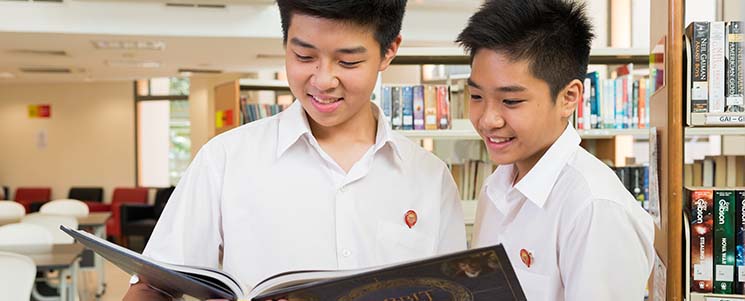
Philosophy
As lingua franca, the English Language performs a fundamental role in Education. The current realisation of the demands for the 21st Century citizen further indicates a need to make students confident speakers and communicators.
Building on the EL Syllabus 2010 objective to develop effective language use, the English Language (EL) curriculum for the ‘O’ Level and IP will further differentiate by strengthening the appreciation of the language through literature and linguistics, and the application of English through knowledge construction and discussions on issues and concepts. Meta-cognition in the form of critical thinking and reflection will be used to activate their learning.
The purpose of such differentiation is toward the engagement of high-ability students cognitively and affectively thereby cultivating a lifelong passion for the English Language. It is hoped that students will see beyond the functional usage of English and appreciate the language as a carrier of culture and meaning.Teaching and Learning Model / Approach
The EL Programme for the ‘O’ Level and IP will adopt the Integrated Curriculum Model (ICM) to structure its learner outcomes. The model, developed by VanTassel-Baska from the College of William & Mary, emphasises on the integration of advanced content, higher order thinking processes and connections to overaching themes and issues as the foundation for curriculum development. In essence, this integrated approach to language learning will create better flow by allowing students to see language use in more authentic situations.
The school will continue to leverage on Teaching for Understanding (TfU) framework which takes from the learner outcomes derived using the ICM to design differentiated units and lesson plans for the IP. By constantly linking back to the throughlines of the units, students will focus on the understanding goals in each lesson and are guided through questions and discussions to apply their understanding through performances. They will thus make connections on all aspects of their lessons to the larger concepts and issues in the unit.Learner Outcome
The curriculum will be structured according to the three dimensions in the ICM which inform on the learner outcomes and design of the curriculum. Equipped with higher proficiency and understanding in the language and literature, the students will then be able to leverage on EL in a professional manner in the future. In particular, students are encouraged to:
(a) Advanced Content Dimension
- Develop linguistic and oral competency
- Develop literary thinking
- Develop skills in giving argument and opinions
(b) Process-Product Dimension
- Develop critical thinking and reflection
- Engender collaboration and participation
- Develop research skills
(c) Concept Dimension
- Assimilate key concepts into existing structures in society and the world
Assessment Plan / Assessment Framework
Assessment plays a key role in differentiating the curriculum for the ‘O’ Level and IP programme. The IP curriculum has greater focus on developing higher order thinking which is seen in performance tasks where students have to apply their learning in challenging and authentic tasks. The ‘O’ Level curriculum is more focused on developing Linguistic and Oral competency and is more structured in its approach to develop thinking skills.
The assessment framework follows from the three dimensions of the ICM where each dimension is assessed using a basket of formative and summative assessment modes. The use of a variety of assessment modes will allow for better matching of performance tasks with outcomes.Assessment modes include:
- Self, peer and teacher assessment
- Portfolio (Oral and writing)
- Journal reflection
- Oral presentation
- Observational checklist
- Group projects
- Test and examination
-
Mathematics
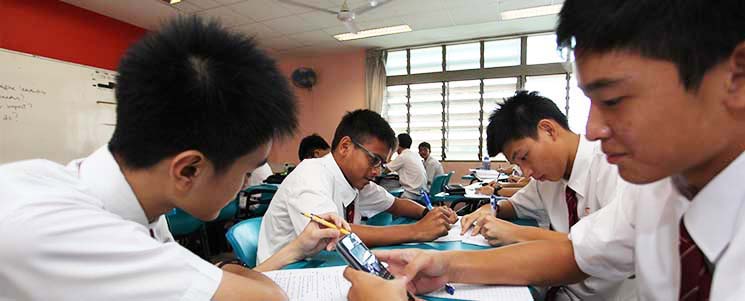
Philosophy
Mathematics is an excellent vehicle for the development and improvement of a person’s intellectual competency in logical reasoning, spatial visualisation, analysis and abstract thought. Students develop numeracy, reasoning, thinking skills, and problem solving skills through the learning and application of Mathematics. These are valued not only in Science and Technology, but also in everyday living and in the workplace. The development of a highly skilled scientifically and technologically based manpower requires a strong grounding in Mathematics. An emphasis on Mathematics education will ensure that we have an increasingly competitive workforce to meet the challenges of the 21st century.
Mathematics is also a subject of enjoyment and excitement, which offers students opportunities for creative work and moments of enlightenment and joy. When ideas are discovered and insights gained, students are spurred to pursue Mathematics beyond the classroom walls.Curriculum
By the end of the course, a student should be able to:
- acquire the necessary mathematical concepts and skills for everyday life, and for continuous learning in Mathematics and related disciplines.
- develop the necessary process skills for the acquisition and application of mathematical concepts and skills.
- develop the mathematical thinking and problem solving skills and apply these skills to formulate and solve problems.
- recognise and use connections among mathematical ideas, and between Mathematics and other disciplines.
- make effective use of a variety of mathematical tools (including information and communication technology tools) in the learning and application of Mathematics.
- produce imaginative and creative work arising from mathematical ideas.
- develop the abilities to reason logically, to communicate mathematically, and to learn cooperatively and independently.
Pedagogy
The Mathematics Department aims to establish a high-quality Mathematics instructional programme based on a sound curriculum and pedagogy that creates thinking, IT competent and self-directed learners who appreciate interdisciplinary learning. The Department focuses on the design of engaging learning activities via the following approaches:
- Teaching for Understanding framework
- Collaborative Learning Strategies
- Mathematical Modeling
- Socratic Questioning
Assessment
The Mathematic Department employs the Mastery Learning approach through regular work assignments, ongoing assessment and lesson reinforcement comprising of:
- Daily written assignments
- topical worksheets (differentiated)
- topical class tests/quizzes
- Alternative Assessment
All work assignments submission are closely monitored to encourage consistent work and revision and to allow teachers to monitor the students’ progress. -
Science
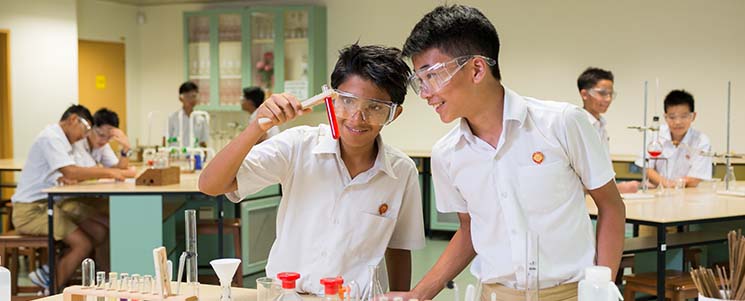
Philosophy
Students are taught for an appreciation of the big ideas in Science and then articulate to Biology, Chemistry and Physics with increasing complexity and elaboration. It is hoped that the curriculum allows the discipline to serve as a means for furthering intellectual growth of students, and facilitating them in becoming constructive agents of change for them community and beyond.
Physics
It focuses on investigating natural phenomena and then applying patterns, models including mathematical ones, principles, theories and laws to explain the physical behaviour of the universe. The theories and concepts presented in this physics syllabus belong to a branch of physics commonly referred as classical physics. Modern physics, developed to explain the quantum properties at the atomic and sub-atomic level, is built on knowledge of these classical theories and concepts. Hence, it aims on acquiring deep understanding of a substantive body of science knowledge, skill development in investigations, scientific thinking and creative problem-solving. It is hoped that the curriculum allows the discipline to serve as a means for furthering intellectual growth of students, and facilitating them in becoming constructive agents of change for the community and beyond.
Biology
Students are provided with knowledge ranging from the level of organisms down to the minute world of molecules. The curriculum has less emphasis on factual materials, but a much greater emphasis on the understanding and application of scientific concepts and principles. This approach has been adopted in recognition of the need for students to develop skills that will be of long-term value in an increasingly technological world, rather than focusing on large quantities of factual material, which may have only short-term relevance. Hence, Biology is a vehicle for developing thinking skills, set against the context of the study of life.
Chemistry
Students are taught for a coherent understanding of energy, matter, and their interrelationships. The theories and concepts presented are foundational to chemistry. Awareness is also brought to the finite life of the world’s resources and hence the need for recycling and conservation; economic considerations in the chemical industry, such as the availability and cost of raw materials and energy; the social, environmental, health and safety issues relating to the chemical industry. The level of abstraction is increased progressively, with students being increasingly asked to think of chemistry in terms of “particles”, “atoms” and “electrons”.
Curriculum
By the end of the course, a student should be able to:
- think critically in science-related research and technology and writings
- possess deep understanding of scientific ideas
- able to draw on scientific and research skills to tackle problems of a scientific nature which can positively impact on environment and community
- able to communicate scientific ideas with ease and clarity
- possesses scientific attitudes and habits of mind
Assessment
To ensure fidelity to the high expectations in terms of knowledge, skills and attitudes, various types of assessments are carried out:
- science fair project
- oral presentation
- Project work
- Written Tests
- Performance based assignments
- Science practical assessments
-
Mother Tongue Languages
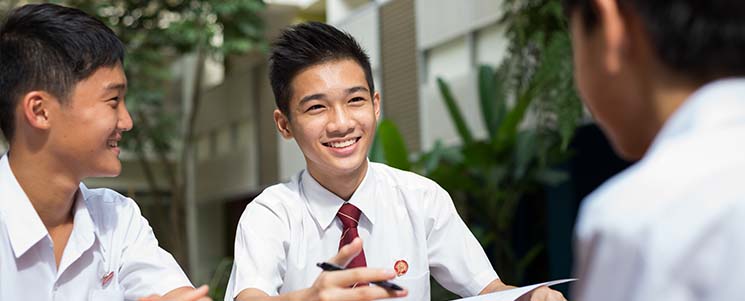
Philosophy
Bilingualism is a cornerstone of our education policy and the key objective of positioning Mother Tongue Languages as a means of staying culturally rooted remains relevant. However the developments in Singapore and around the world indicate that we need also to help our young acquire the proficiency and ability to communicate in MTL, develop an unique identity through a deeper appreciation of their culture, traditions, literature and history, and to make connections with other communities in Asia and beyond. Appropriate emphasis is needed to equip students with the skills to apply their MTL in real life settings and to use it for communication. With the ability to use a second language developed, the students will also possessed cross-cultural literacy which are regarded as necessary 21st Century competencies in a globalised world.
Learner Outcomes
The VS MTL Programme aims to develop proficient language users who can communicate effectively in various real-life contexts. It also aims to expose students to cultures and values through the MTL lesson. The students will also become self-directed learners in MTL who are able to leverage on ICT and other methods to take the learning of MTL beyond school years.
For all students that enter VS, the MTL curriculum seeks to:- Strengthen communication and thinking skills – students to be able to think critically, creatively and analytically so as to present their ideas confidently and effectively, in both written and spoken forms.
- Deepen appreciation of culture – students to be able to strengthen the bonding within community and reinforces their sense of cultural heritage and to achieve a deeper appreciation of culture, history and values for the more able learners.
- Better connect with various communities – students to be able to establish connections with other communities in Asia and beyond as they venture out to seek opportunities overseas, as the proficiency gained in MTL provides them with a distinct edge in understanding other mindsets.
And for the more able learners, the curriculum aims to develop them to higher levels of language proficiency and cultural knowledge with exposure to literature and history so that they are able to develop sensitivity in cross cultural literacy through the elective modules offered in VS. Equipped with higher proficiency and understanding in the language and literature, the students will then be able to leverage on MTL in a professional manner in the future.
Teaching and Learning Model / Approach
The MOE MTL syllabus is designed by organizing the learning objectives in a spiral progression by reinforcing the language sub-skills as the students progress up the levels. As such, VS MTL curriculum use Teaching for Understanding (TfU) as a framework to structure learning towards attaining a higher proficiency and understanding in the language with the same objective in mind. By defining the ‘Throughlines’ (big, overarching goals) in the national syllabus, school-based curriculum such as performance tasks projects are designed to provide students with opportunities to apply and use the language in authentic, real-life context that mirrored their lives to complement the learning in the textbooks.
As such, the curriculum designed is centred on engaging the learners with interactive and innovative teaching strategies. It will also provide students with authentic performance tasks to apply their skills learned in class to see the relevance of using MTL in authentic real-life context. In the process, inspire in students a love for the language and culture, so as to nurture effective and confident communicator and self-directed learner in MTL.
Lessons conducted are pupil-centred and focus on developing students’ critical thinking and creative thinking skills. Teachers will also leverage on ICT to provide students with more interactive and real-life authentic learning to promote independent, self-directed and collaborative learning.Assessment Plan / Assessment Framework
Assessment plays an important role in developing students’ proficiency in MTL. It does not serve only as an evaluative tool, but also as an instructional tool to promote students’ learning. Particularly, the formative assessment will allow the teachers to adapt teaching to meet students’ learning needs as well as allowing students to take control of their learning from the feedback received (self-regulated learning).
Catering to the profile of students in VS, a basket of both formative and summative assessment modes is used. The assessment modes would include the followings:- Self, peer and teacher assessment
- Portfolio (Oral and writing)
- Reflections
- Oral presentations
- Observational checklist
- Group project work
- Test and examination
- Creation of graphic organizer and/or media production (e.g. powerpoint or video clips)
Syllabus Outline
To address the Learner Outcomes listed earlier, 3 domains of core skills are listed in the syllabus. These 3 domains are namely, Integrated Linguistics Application, Humanistic Literacy and General Competencies.
Integrated Linguistic Application underscores the importance of nurturing proficient users who are capable of learning MTL and using it to communicate effectively in real-life settings. The proficiency will be a vehicle for the more able students in IP to expand their learning into areas such as history and studies of a country or region to gain understanding and insight into the people’s mindset and relate to them in the future.
Humanistic Literacy comprises of values, cultures, care for others and awareness of society and the world adds value by building on students’ cultural understanding. This raises the humanistic literacy of students in areas of cultural sensitivities and negotiating the complexities of a globalised world, aside from transmitting the traditional culture and values.
General Competencies cover independent learning, ICT skills, thinking skills and social and emotional learning. These areas address the intangible and unsynchronised development of students’ general disposition, and are skills and disposition needed to face the challenges of the 21st century. -
Aesthetics
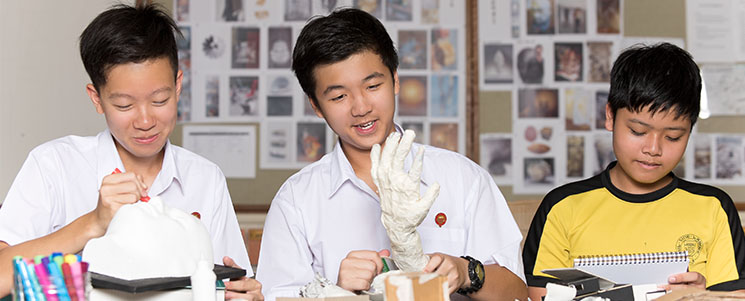
Philosophy
The Aesthetics & Design Department emphasizes on the development of Design-Thinking skills in students and encourages the use of design thinking processes in solving authentic situations through Art, Design and Technology (D&T), Food and Nutrition (F&N) and Music. The teaching and learning of Design-Thinking through this grouping of subjects involves research and the reasoned application of knowledge and skills in the respective elective subject areas and is focused on the needs, wants and desires of end users.
Department Objectives
The Aesthetics & Design Department aims to:
- develop design thinking and communication skills (Confident Communicator);
- develop an appreciation of the aesthetics through art, design, food and nutrition, as well as music (Self-directed learner & Critical Thinker);
- develop an awareness of art, design, nutrition and music in the contexts of society, culture and environment (Social Innovator); and
- acquire knowledge and skills of the subject through the contexts of the authentic design-thinking projects (Social Innovator, Self-directed learner, Confident Communicator & Critical Thinker).
Teaching Approach
The core subject model adopted in the Aesthetics & Design Department is Design-Thinking. However, various other subject models will also be employed in the teaching and learning. These include:
- Teaching for Understanding
(a) Collaborative Learning
(b) Problem Based Learning
(c) Socratic Questioning
(d) See, Think & Wonder - Student-Centred and Independent Learning
Assessment Principles
- Summative and Holistic. Eg. Courseworks, Examinations.
- Continual. Eg. Project Based Assignments.
- Informal Assessment. Eg. Peer Assessment, Teachers’ feedback, Industrial Partners’ feedback, Participants’ Survey.
- Learning through reflections. Eg. Learning Journals and Interviews.
-
Humanities

Philosophy
In Victoria School, Humanities education is the study of the understanding and appreciation of the relevance of the humanities for personal growth and active participation in society. In this programme, we strive to enrich, develop and nurture each Victorian to be an ethical, capable and gracious citizen of society, who can live, play and work with others with an open and critically inquiring mind.
Curriculum
Knowledge:
- Geography – deep understanding of physical and human environments – dynamism and change; place and characteristics; use of resources; sustainability
- History – deep understanding of diverse approaches and purposes to different interpretations of history – patterns and trends; present and past; cause and effect; change and continuity
- Social Studies – deep understanding of Singapore, its constraints, policies and challenges
Skills:
- Geography – conduct fieldwork, offer solutions/alternatives, recognise patterns, deduce relationships, make decisions
- History & Social Studies – construct arguments, make informed judgments, see connections
Values:
- Responsibility to self and society in thought leadership & character mastery
- Empathy and sensitivity of concerned global citizen rooted to Singapore
- Intellectual curiosity and rigour in critical and inventive (creative) thinking and actively making sense of the world around you
- Respect for others and acceptance of and tolerance for divergent points of view
Pedagogy
The Humanities in Victoria School is centred on a pedagogical approach focused on developing deep conceptual understanding. The Teaching for Understanding (TfU) approach is our way of structuring the learning towards attaining the goal of deep understanding. Towards this end, the main pedagogy strategies include Socratic Questioning, Cooperative Learning, Inquiry approach, inter-disciplinary learning, field work and data collection, role play, dramatisations, debates, oral presentations, multimedia presentations and blended learning incorporating face-to-face learning and ICT platforms that support collaborative learning (facebook, blogs, wiki, discussions, synchronous platforms for video-conferencing with external/internal agencies).
Disciplined-specific pedagogical methods are used to induct the learner towards the knowledge, skills and attributes of experts in the field. History learning is focused on historiography. Geography learning uses the inquiry approach. Social Studies learning uses the case study approach.To augment the learning within the classroom, opportunities will be given for pupils to experience learning in the field. These include:
- local and overseas field trips to museums, theatres, countries (pupils will be given the opportunity to organise field trips)
- collaboration with universities, institutions for talks and competitions
- mentorship with practitioners and professors in tertiary institutions, e.g. Humanities and Social Studies Research Programme (HSSRP)
- mock conferences
- service learning
- internship / attachment
Assessment
The assessment principles are based on the belief that assessment is a mechanism to provide timely feedback to address learning gaps to pupils so that they can adjust learning tactics, and for teachers to consider their intervention strategies. The Humanities teachers believe in the use of holistic and authentic assessment to assess 21st century competencies, and in a balance of formative and summative assessment and assessment for, of and as learning.
Assessment modes include:- self & peer assessment
- performance task
- test & examination
- oral presentation (and defense)
- open book test
- assessment of individual class and online participation
- portfolio assessment
VS MUN Sites
-
Physical Education (PE)
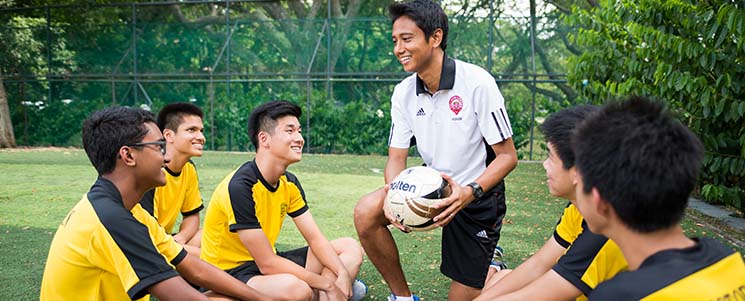
Philosophy
Physical Education is offered through 2 programmes. The broad-based PE programme is offered to all students from Sec 1 to Sec 4. A specialised programme, GCE “O” Level PE is offered to a select group of students at Sec 3 and 4 who demonstrate talent through the broad-based programme and CCA.
Physical Education plays an important in the overall development of the student. Through this subject, the student should be able to:- Understand the importance and benefits of physical activity
- Actively participate and enjoy a variety of physical activities
- Demonstrate positive personal traits like sportsmanship, teamwork and fairplay
- Attain a level of fitness to maintain an active lifestyle
- Participate in physical activity in a safe manner
Curriculum
The following topics are taught as a channel to attain the objectives of PE:
- PE Theory (Sec 1 and Sec 2)
- Fitness Management
- Athletics
- Games
Pedagogy
Key strategies used in physical education include:
- Instruction to the class as a whole group
- Instruction and demonstration in small groups
- Peer instruction (between students)
- Drills in small groups
- Small-sided games
Assessment
- PE Theory Written Test (MCQ, short answers) – Sec 1 and 2
- Athletic Standards Tests – Sec 2 and 3
- Game Assessments – Sec 2 and 3
- FITT Programme Plan – Sec 2
- NAPFA Test – Sec 1 to 4
Enrichment
- Swim Safer Course – Sec 1
- Inter-class / Inter-House Games in Victorian Experience
- Sports Education Modules (eg, Dance, Archery) in Victorian Experience

